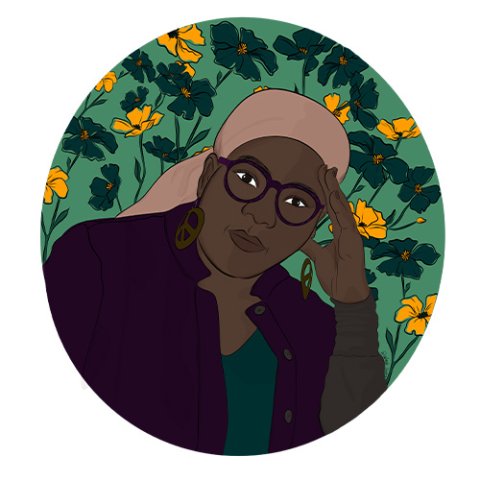By Javier Alcantara
art by Naimah Thomas
On October 20, 2022, we had the privilege to learn from grassroots organizer and abolitionist, Mariame Kaba, who shared her valuable reflections on community, humanity, and what it means to hope through trying times.
After an introduction by Civic Media Fellow Niki Franco, the talk began with the much-needed recognition of something felt by everyone who yearns and fights for societal change–that our world can be a truly terrible place. Growing up facing the many injustices in New York during the 1980’s, Mariame fully understood just how bleak things could get. Yet despite all this, Mariame reminded us that no matter how discouraging and scary things are right now, we are not alone in the struggle. With that thought, she invited everyone to be present together during dark times.
Mariame emphasized that good definitely still exists. She recalled the story of Mr. Henry Yao, a Chinese immigrant and small business owner in lower Manhattan, and highlighted how Mr. Yao unknowingly practiced restorative justice toward people who initially came to do him wrong. He always offered them growth and a chance to redeem themselves rather than punishment. Inspired by his kindness, Mr. Yao’s customers pitched in and came together to save his business from collapse during the early months of the COVID-19 pandemic.
People helping other people in need, and in turn, realizing their shared humanity with others– this was a theme present throughout the story of Mr. Yao. Mariame explained that this was an example of the Zulu concept, Ubuntu, which was popularized by Archbishop Desmond Tutu. In Ubuntu, a person is a person through other people, and all of humanity is interconnected and interdependent. As further explained by Tutu, we embody a “me we” mindset, and acknowledge that “the only way we can ever be human is together. The only way we can be free is together.”
Mariame asked us to reflect on our current sense of Ubuntu, and whether or not the past three years of the pandemic have helped us to develop the “me we” mindset of Ubuntu, or the opposite, “me me.”
“None of us would survive without other people,” Mariame reiterated this point as she remembered the actions of a small group of volunteers at the Cook County Jail in Chicago. For two years, 7 days a week, the volunteers spent their evenings tending to the needs of newly-released inmates who have been subjected to much inhumanity during their incarceration. As an abolitionist herself, Mariame asserted how destructive jails and prisons could be for the individual and the community. Jails and prisons alienate people from their communities and dismantle their sense of Ubuntu. Mariame saw how these volunteers worked to uphold the spirit of community, and how all their efforts stemmed from the fact that they see the humanity of the other person.
Through the example of the Cook County Jail volunteers, Mariame pointed out that actions matter not only to those who are on the receiving end, but also those carrying out the actions. Mariame further explained that every day is filled with opportunities for action–little invitations of resistance–and there is always a way for us to collectively build on our ability to act, whether through volunteering, organizing, or in any small way one could offer. It is these little actions that will help create a more just world.
Mariame closed her talk repeating that while suffering and inhumanity exist, so too does compassion, kindness, and selflessness. She called on everyone to resist the despair that comes with injustice, plant yourself where you are needed most, cultivate your imagination of a better tomorrow, and ultimately remember that “hope is a discipline.” For Mariame, hope is not something you have, but something that you do. It is something you practice daily and commit to.
The struggle for change may be an endless one, but for Mariame, it is an act of love. And that makes it all worthwhile.
